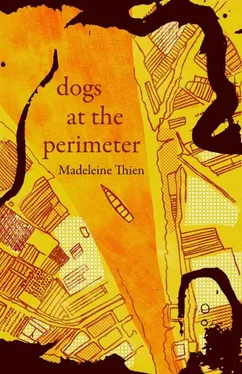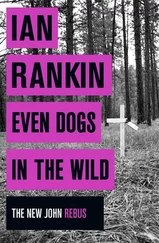A teenaged boy was sent to guard us. He was tall, no more than fourteen years old, with an angular, mischievous face and a rifle slung across his back. He tapped the gun nervously, unable to keep his hands still.
The night sky came nearer, it was a cloth tightening around us, erasing the world. In my dreams, I saw bodies everywhere, infants and grown men, a wide-eyed girl, my brother, men built like steamships and others like sticks. I saw them all, as if we were on a road together, one body growing from the next, soaking into the ground. Above us, sugar palms stretched thinly up in the sky, into streaks of blue and golden light. I saw village houses, seated in a row. Here at our destination, I was the only one alive. I couldn’t move or speak, fear was a shunt in my chest, I wanted to cry out but I couldn’t even breathe.
I woke. I saw the tall boy with the gun, asleep against a tree, his mouth open, round like a baby’s.
“That boy,” my mother said, her voice low. “There’s something familiar about that boy.”
Our first day here began. We built three bare structures to shelter our group, and we covered each with a roof made of thatched palm leaves. They were dry and tough, my hands bled from weaving them together, everybody’s hands bled because we were city people used to paper, pens, and smooth typewriters. There were teachers, students, a dentist, a banker, drivers, machinists, a hotel manager, there were families like ours where the father had been sent away, there were dozens of children. Villagers came and went, watching us. Cautiously, my brother approached them. He asked them to advise us on the proper knitting of the leaves, and a boy his age stopped to help us. Sopham, my small, earnest brother, worked hard, harder than all the rest.
At mid-day, the banker came and sat beside us. He had joined our group only a few days before, but we had never seen him sober. Along the way, he had traded all his extra clothes for rice wine. “Slow down, child,” he said to my brother. “You must try not to draw attention to yourself.”
Sopham looked up. After a moment he said, “I don’t want to sleep in the open tonight. Smell the air, Uncle. It’s going to rain.”
“Which one of these men is your father?” the banker asked.
“They sent him to study.”
“To study,” the banker said. “Sent with his hands tied behind his back. Sent to the forest where there is no electricity, no school, no teachers, no books. Is that how an educated man studies? What theories will he memorize there?” He smiled at us because he was unhappy. “My eldest boy is one of them,” he said. “He went to fight with these jungle Communists but I always warned him, the Khmer Rouge are less than human, they have no soul, no pralung . They’ll cut your throat before they introduce themselves —”
“How dare you,” my mother said.
He looked up, startled.
“Get away from my children.”
“But, madam,” the banker said. “Have I said something untrue?”
Other voices hurried forward. Lower your voices. Those are rumours, only rumours. Can’t you see he’s drunk? They drew protectively around us, shutting him out.
“I’ve drunk nothing!” the banker said, shouting now. “Go on then, keep playing. Make your little houses! You have my pity.” He stood up, smoothed his clothes, and walked unsteadily away. My mother stared after him.
I saw the teenager with the gun watching us, an amused smile on his lips.
That night, we huddled together inside the makeshift hut. The shelter had no walls or floors. A chill crept in, eating its way under my clothes, around my feet, into my bones. Rain splashed against my face. I had never truly known the cold before, all my nerve endings felt seared awake, dipped in ice. The smell of food drifted over us, sweet and fragrant. My mother got up and walked to the village houses. When she returned, triumphant, she held an egg in her hands. “All they asked for was a ballpoint pen,” she said. Salt, pepper, and herbs had been pushed in through a tiny opening in the shell, before the egg was boiled. It was the best thing I had ever tasted, the salt made my mouth water with pleasure. My mother didn’t eat. She took a fragment of shell and traced a line against her wrist, over and over, until the shell disintegrated in her fingers. “Your father is in Phnom Penh,” she said wistfully. “He’ll be here soon. It isn’t far. Along Route 1, it’s just a hundred kilometres.” I breathed in the scent of the wet ground, all the bodies around us, a rotting smell that expanded like moisture in my lungs. The stars crept near, too close, too cold. My brother held my hand. There was a low moaning of children, complaining, asking for food, that never seemed to cease.
I begged my father, Come and find us before we disappear.
One or two at a time, in the night, people went away.
Don’t ask. Don’t look into the holes.
Here is the answer: Do you want to see?
Every day, the quiet expanded. There were gangs of boys who came and went, who boasted of the cleansing they had done. They were sly and unpredictable, at sudden moments they smiled at us and the smiles were as sharp as tiny cuts. Angkar had divided us into the pure and the impure. On one side were the peasants, the mulatan , the true Khmer. On the other were the April 17 people, the population that had been expelled from the cities.
“The wheel of history is turning,” Kosal said, lecturing us, his drooping eyes impervious to our hunger, to fear, to rage. “If you use your hands to try to stop the wheel, they will be caught in the spokes. If you use your feet to try to stop it, you will lose them too. There is no turning back.”
He called us the new people, he said we must abandon our diseased selves, we had to cut loose our dreams, our impurities, our worldly attachments. To pray, to grieve the missing, to long for the old life, all these were forms of betrayal. Memory sickness, Kosal called it. An illness of the mind.
In the hut that night, the banker sighed for everyone to hear, “If I lose my mind, forget everything, became ignorant, will I be cured, Monsieur Angkar?” He stayed alone in a corner and nobody answered him. “You imagine,” he whispered, looking at us, “that it will end. Don’t you?”
Every day, we woke on a knife edge and we ran along it. We crushed makloeu berries and used the dark juice to dye our clothes. We cut our hair. When the sky was still black, the adults were summoned to their work brigades. From four in the morning until nightfall, they ploughed the soil, dug canals, planted seedlings, then transplanted these seedlings to the fields. Twice each day, Angkar rationed us a bowl of water with two or three spoonfuls of rice. My mother would eat quickly and then sit very still, holding her shivering body. “I’m tired, my darling,” she told me. “I’ve never known such tiredness.”
At first, we children were left behind. We scavenged the nearby forest and collected firewood, roots, fruit, and tree bark. My brother, who had never fit in with boys his own age, who preferred to sit at home with his records, had an instinct for the wild. With the dentist’s son Oun, and a few of the village boys, he choked rabbits, twisted their necks, pulled them inside out. When we had meat, if for a moment I felt full, daylight seemed to expand again, colours returned and melted the tightness in my chest.
One of the mulatan , an old woman, tried to keep us occupied. She gave us seeds and spoke kindly about soil and water. She said the war had left Cambodia in disrepair. The Americans had bombed our schools, our roads and reservoirs. To survive, we had to feed our country. Food was our first defence, our most powerful weapon.
The seeds were like letters in my hands. Day after day, I knelt in the dirt, dragging weeds from the ground, imagining the beans, peppers, and cucumbers that would tangle around us.
Читать дальше












